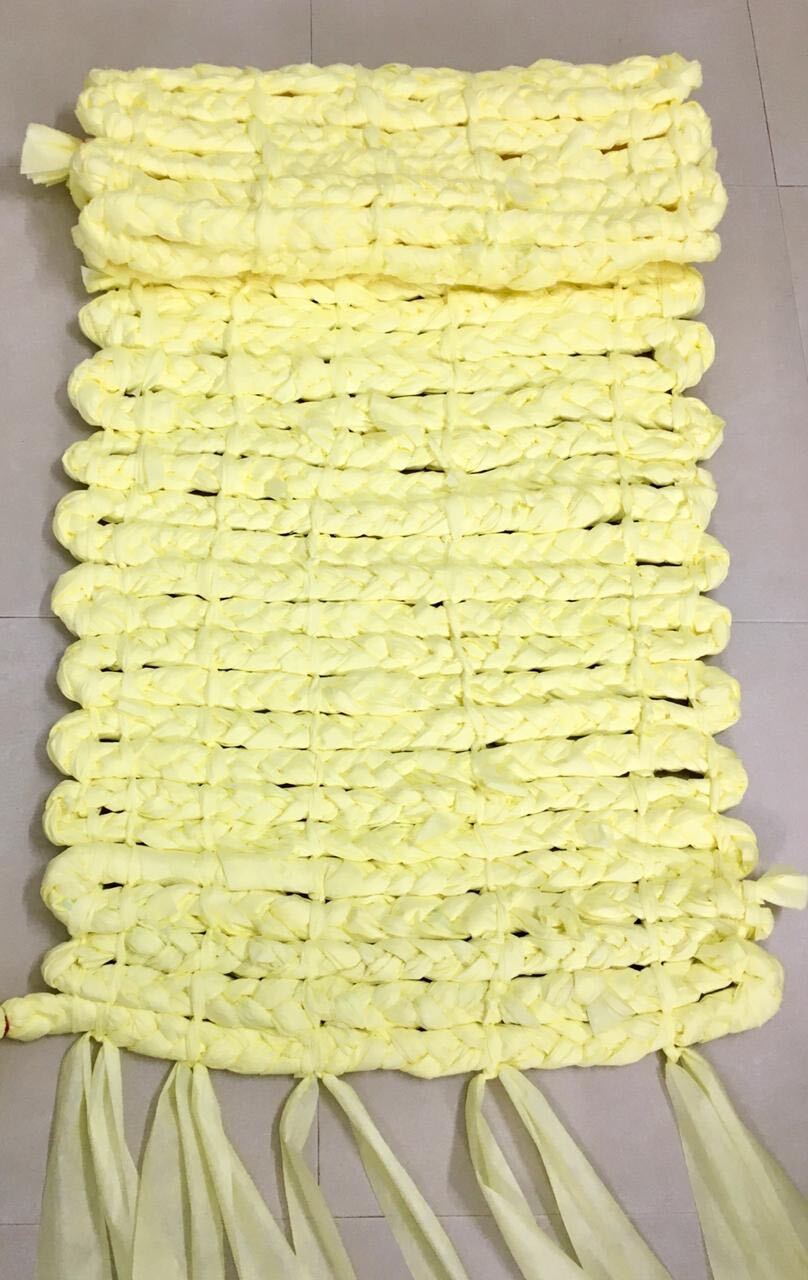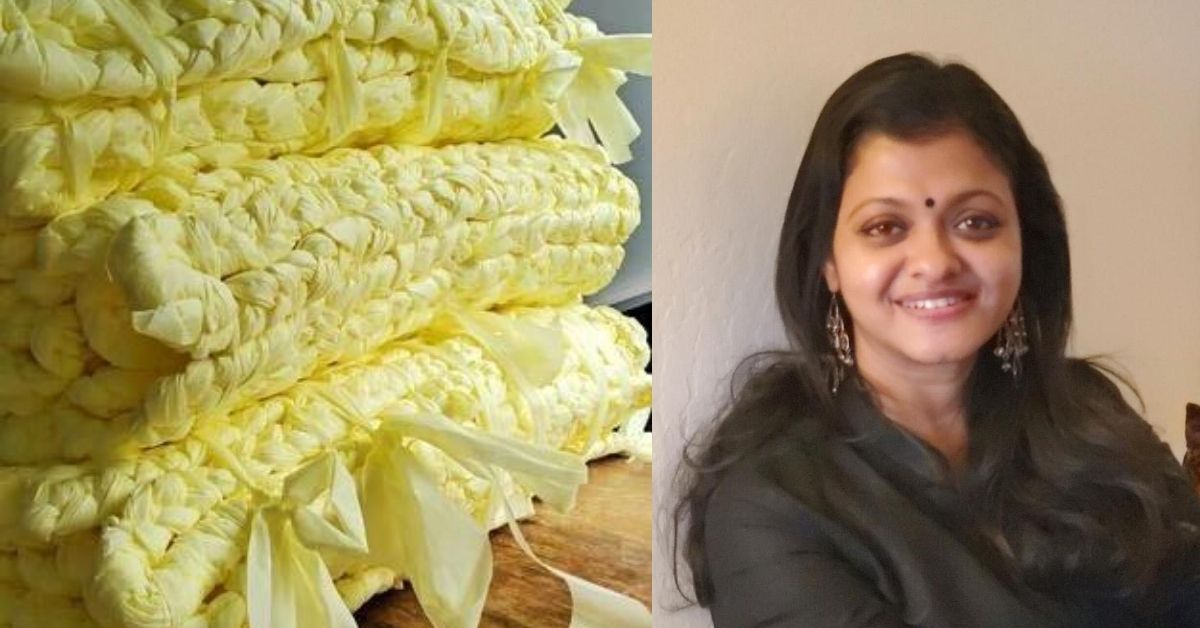Lakshmi Menon is a well-known eco-innovator in Ernakulam, Kerala and the founder of Pure Living, an organisation focussed on finding sustainable livelihood solutions. After crafting pens made from waste paper, she has yet again come up with a new invention — an eco-friendly mattress named Shayya, that aims to solve two pressing issues: waste management and the lack of bedding at many COVID care centres.
“In Kerala alone, there are more than 900 panchayats, and each has a varying number of care centres, with a minimum capacity of 50 beds. In these areas, mattresses are the need of the hour for every patient. One mattress costs somewhere between Rs 500-700, and it has to be replaced for each infected patient, or it has to be washed properly. In fact, this is not the case only in Kerala, but all over India,” says Lakshmi

About Shayya
The lightweight bedroll is made from the scraps of the material used to make Personal Protective Equipment (PPE) gowns.
With a sharp rise in demand for PPE gowns in hospitals, and among individuals, many textile manufacturers and tailors have turned to stitching these gowns. According to Lakshmi, some tailors in Kerala have been receiving orders for 20,000 gowns every day.
“While they work day and night to make these garments, there is also a large quantity of scrap material left behind from making them. The waterproof material contains small amounts of plastic, and cannot be recycled easily. It has to be disposed of or recycled by a professional agency which small tailors cannot afford, so they burn it to get rid of the large quantities that pile up every day. It was quite disturbing to see that, and I had to do something,” says Lakshmi.
How is the ‘Shayya’ made?
Step 1: Three pieces of the scrap cloth are placed next to each other and braided together.
Step 2: As the cloth reaches the end, more scraps of cloth are added and braided until it reaches 25 meters in length.
Step 3: This is placed in a zigzag pattern, and tied together using more scrap cloth. The bed has to be at a length of 6ft, and a width of 2.5 ft.
Step 4: Finally, identify the loose ends and tie them with each other
“The method requires no thread or needle, and the bed remains strong and sturdy. The material is water-proof, and it can be cleaned by washing in soap water and allowing it to dry, ” says Lakshmi.
Lakshmi claims that from a small production unit which has a stock of 6 tonnes of cut-waste, 2400 Shayyas can be made, adding that it would cost Rs.12 lakh to purchase the same as cloth bedding.
Apart from using these bedrolls at COVID care centres, it can also be distributed among homeless people who are forced to sleep on hard surfaces.
Providing Employment
A few weeks ago, she identified tailors who were stitching PPE gowns in Kerala and approached them to collect the scrap cloth. She also engaged local women from her neighbourhood who had lost their jobs during the lockdown, to make the Shayyas.
“I have employed ten women for Rs 300/day, and they make one Shayya each. Earlier, three women were required to make one bed — one to braid it, and two to hold the other ends to align it in place. But, now we have introduced a 6×4 ft plywood fitted with nails on either side of the frame. This helps to hold the cloth in place while one lady braids, and aligns it together. With this upgrade in our mini production unit, each lady can make two Shayyas in one day,” says Lakshmi.
The production of Shayyas started three days ago, and more than 15 pieces have already been made. Her plan is not to sell the product, but to distribute them for free across panchayats in Kerala.
The Covid Care Centre at Amballur Panchayat in Kerala has received 5 beds from Lakshmi. Beena Mukundan, the Standing Committee Chairperson of the Panchayat says, “Earlier we were using the regular variety of cloth mattresses which had to be disposed of after the treatment of one patient. With Lakshmi’s ingenious idea we are able to reduce the waste generated, expenses incurred, and offer patients comfortable bedding.”
After Lakshmi shared this over social media, she was approached by some corporate companies (who do not wish to be named) who wished to purchase the beds from her and distribute it for free across different Panchayats in Kerala.
“For them, I charged Rs 300 for one bed, which is the charge of employing one worker for the day,” says Lakshmi.
If there are individuals or companies who wish to purchase beds from Pure Living and distribute them across COVID Care Centres in India, you can contact Lakshmi Menon at +91 8330021192.
Image courtesy: Lakshmi Menon
(Edited by Gayatri Mishra)
If you found our stories insightful, informative, or even just enjoyable, we invite you to consider making a voluntary payment to support the work we do at The Better India. Your contribution helps us continue producing quality content that educates, inspires, and drives positive change.
Choose one of the payment options below for your contribution-
By paying for the stories you value, you directly contribute to sustaining our efforts focused on making a difference in the world. Together, let's ensure that impactful stories continue to be told and shared, enriching lives and communities alike.
Thank you for your support. Here are some frequently asked questions you might find helpful to know why you are contributing?

